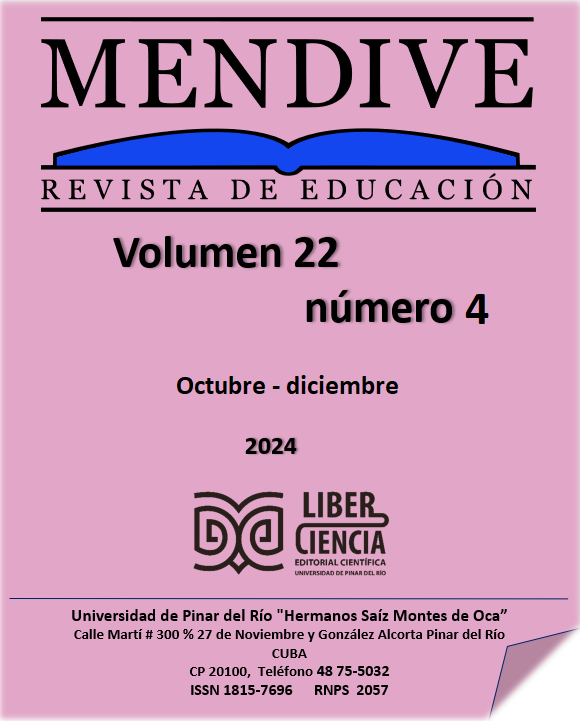Affectivity as a strategy against school violence
Main Article Content
Abstract
The study focused on the importance of affectivity in the socio-emotional development of students and the formation of social characteristics at home to connect with the educational community, where emotional capacities are put into practice in various conflict situations. The objective is to identify the factors that influence school violence, through a bibliographic review and placing the family nucleus as the main indicator of the socio-emotional development of boys and girls, to propose strategies that generate an atmosphere of affection in the classroom. The research approach was qualitative, based on a bibliographic review, with a comparative analysis of studies, methods, results and conclusions from bibliographic sources of different scientific journals. Finally, the central ideas of several authors were synthesized and divided into three important aspects such as: affectivity as a solution to school conflicts, the influence of the family nucleus on violent behavior in the classroom and strategies to generate an environment of affectivity in the classroom, which helps to reduce aggressive behavior in students in the school context. It was concluded by affirming the importance of affectivity in the development of social and emotional skills in education; certain family factors that trigger violent behavior in the classroom were established and evaluative indicators were proposed to recognize environments of coexistence and a culture of peace in educational institutions.
Downloads
Article Details

This work is licensed under a Creative Commons Attribution-NonCommercial 4.0 International License.
References
Aldana Zavala, J., Vallejo Valdivieso P., y Isea Argüelles, J. (2021). Investigación y aprendizaje: Retos en Latinoamérica hacia el 2030. Alteridad, 16(1), 78-91. https://doi.org/10.17163/alt.v16n1.2021.06
Andino, R. (2018). Capacitación docente: Pilar para la identificación y gestión de la violencia escolar. Alteridad Revista de Educación, 13(1), 108-119. https://doi.org/10.17163/alt.v13n1.2018.08
Barrera, D., Restrepo, C., Labrador, C., Niño, G., Díaz, D., Restrepo, D., Lamus, F., López de Mesa, C., Mancera, B. (2006). Family environment and school environment: Triggers and antidotes to aggressive behavior in school-aged children. Journal of Person and Bioethics 10(2), 99-107. http://www.scielo.org.co/pdf/pebi/v10n2/v10n2a06.pdf
Fierro Evans, C., y Carbajal Padilla, P. (2018). El papel de la familia en el desarrollo social del niño: una mirada desde la afectividad, la comunicación familiar y estilos de educación parental. Revista Psicoespacios 12(20), 173-198. https://doi.org/10.25057/issn.2145-2776
García, L., Iriarte, C., y Reparaz, C. (2019). Apego y competencias socioemocionales del profesorado. International Journal of Developmental and Educational Psychology INFAD, Revista de Psicología, 1(1), 119-128. https://revista.infad.eu/index.php/IJODAEP/article/view/1413
Godoy, M.y Campoverde, B. (2016). Análisis comparativo sobre la afectividad como motivadora del proceso enseñanza-aprendizaje - casos: Argentina, Colombia y Ecuador. Sophia, 12(2), 217-231. http://www.scielo.org.co/pdf/sph/v12n2/v12n2a06.pdf
Gordillo, M. G., Fernández, M. I., y Herrera, S. S. (2016). Clima afectivo en el aula: Vínculo emocional Maestro-Alumno. International Journal of Developmental and Educational Psychology INFAD Revista de Psicología, 1(1), 195-202. https://www.redalyc.org/pdf/3498/349851776022.pdf
Guillermo, L. Y. (2017). Programa de técnicas asertivas en el aula para mejorar las relaciones interpersonales de los estudiantes de educación primaria. In Crescendo, 8(2), 179-191. https://dialnet.unirioja.es/servlet/articulo?codigo=6223025
Gutiérrez Cobo, M., Cabello, R., y Fernández Berrocal, P. (2017). Inteligencia emocional, control cognitivo y estatus socioeconómico de los padres como factores protectores de la conducta agresiva en la niñez y la adolescencia. Revista Interuniversitaria de Formación del Profesorado, 88 (31.1), 39-52. https://dialnet.unirioja.es/descarga/articulo/5980924.pdf
Mora Cifuentes, P. (2016). Conocimientos, habilidades y actitudes de los docentes constructores de paz. Mundo Fesc, 11, 72-79.https://www.fesc.edu.co/Revistas/OJS/index.php/mundofesc/article/view/84
Noroño, N., Segundo, R., Sorroche, R., y Fernández, O. (2002). Influencia del Medio Familiar en niños con conductas agresivas. Revista Cubana Pediatría 74 (2), 138-44. http://scielo.sld.cu/pdf/ped/v74n2/ped07202.pdf
Piaget, J. (2005). Inteligencia y Afectividad. Grupo Editor, 2005. http://materiadeapoioaotcc.pbworks.com/f/PIAGET+JEAN+INTELIGENCIA++Y+AFECTIVIDAD.pdf
Ramírez López, C., y Arcila Rodríguez, W. (2013). Violencia, conflicto y agresividad en el escenario escolar. Educación y Educadores 16(3), 411-429. https://www.redalyc.org/pdf/834/83429830002.pdf
Robledo Ramón, P., y García, J. N. (2008). El contexto familiar y su papel en el desarrollo socio-emocional de los niños. International Journal of Developmental and Educational Psychology, 4(1), 75-82. http://infad.eu/RevistaINFAD/2008/n1/volumen4/INFAD_010420_75-82.pdf
Zambrano Villalba, C., y Almeida Monge, E. (2017). Clima social familiar y su influencia en la conducta violenta en los escolares. Revista Ciencia UNEMI, 10(25), 97-102. https://core.ac.uk/download/pdf/276552314.pdf
Zumba Tello, D. y Moreta Herrera, R. (2022). Afectividad, dificultades en la regulación emocional, estrés y salud mental en adolescentes del ecuador en tiempos de pandemia del Covid-19. Revista Psicología de la Salud, 10(1). https://doi.org/10.21134/pssa.v10i1.801


